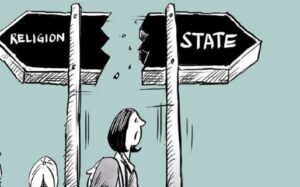Change we need

By Shahid Rizvi
It may appear odd now to write against the right of owning property – immovable or movable, cash or kind, limited or unlimited – because this is considered a fundamental right of every person in our society and in all the societies the world over. One can have houses, bungalows, buildings, land, plots as many as he likes: cash, bonds, shares, certificates, securities, as much as he wishes: and an unlimited number of factories, business houses, marketing networks, storehouses full of raw materials, and as many bank accounts in foreign and domestic banks as suited to his empire.
The underlying idea for the sanctity of this right is that whatever one gains is the result of labor, hard work, initiative intelligence, and expertise in dealing with transactions. The right to own property is further considered as an alienable appendage of his freedoms as a civilized citizen. On the face of it, the explanations are very charming and appear to be very convincing. But let us think again.
Going through the history of evaluation of human society which has been very minutely probed into by historians, we find that every society that allowed personal interests to prevail over the collective interest had to suffer in economic, social, and moral credibility. Save early uncivilized societies where collective ownership of property was the norm all other societies had their population divided into places and slums. No period in history can be pointed out as having no hungry and shelterless people — and always in a large number — in its fold. The ‘sacred’ law of having personal property first struck the woman — who had to surrender her freedom to become the personal property of a male. The supremacy of male in all our present societies is a known fact that is accounted for by strange customs and traditions. A male child a few years old becomes the chief of the family on his father’s death and even his mother has to bow before him for blessings. However, that is another story.
The ownership of properties is badly divided into two types – one belonging to personalized items and the other relating to personal ownership of collective property. There is no watertight compartment to separate them — in fact, their boundaries interpenetrate and supplement each other. The extension in personalized items stretches their claws to the collective property. Where could else very high standards of personal comforts and luxury come from? It is not simply my share of the social wealth. It is much more than that. There is a saying of Hazrat Ali (RA), “Wealth cannot be amassed without usurping rights of others” and he was referring to personal wealth at that time. In the case of possession the social wealth i.e. the means of the production of the society — land, raw material, production equipment, labor, capital, — and using it according to one’s whims and wishes naturally in the interest of profit, the claiming the profit, as one’s personal reward, has always been a devastating factor for the society.
No doubt sometimes it proved fruitful for the development but only at times when there were high prospects of profit. It is clear that despite the labyrinths of economic terminology, huge profits cannot be earned by an entrepreneur without exploiting the rent of the other factors of production. The other factors of production — especially labor — is never fully paid.
The capitalist system of production, more than any other system, has brought transformations in the ownership patterns of the collective property, but keeping the peg intact. It started from small manufactories owned by artisans, rising to factories and giant production enterprises owned by a capitalist, the ownership pattern turned to industrial plus financial oligarchy. And then came the share market with every enterprise having a dominant share of a family. Syndicates and monopolies appeared. Now the ownership belongs to one person but to a group of the representatives of the class. Stock markets to have a fast grip on the market’s capability of hoarding and distribution, appeared under the control of the same representatives. And at the turn of the mid-century, there came up the huge multinational corporations which even the group of owners were helpless to control due to their immense diversity. Onward developed new patterns — increasing the role of trade unions in the affairs of the shop floor and a say allowed to the employees. The capitalists of the countries where MNC operates were also to be asked to cooperate — certainly at some cost to the owner of the mother MNC.
All these changes point out to be broadening of the base of ownership through certainly involuntarily and to the much resistance of the capitalist owners.
With the democracy-oriented awareness in the masses and a desire to control their own resources and remove constraints the ownership patterns are further going to change. A peaceful evolutionary process is the main content of the history of our time. Though it will take a long time, yet there is no force to stop the withering away of the main curse of society — the private ownership of means of production.
The capitalist ideologue claims, and that personal incentive and profit are the main motives of the development of society. Hence capitalism is invincible. They hide the fact that the development of society is the product of the common man’s intelligence and the laws of nature. The man who invented the wheel had no intention of getting it patented for profit. He who invented fire also had no profit motive. Man is a social animal and loves not only himself but also his family and other social beings. Those who work with exploitation motives are few. There are teachers, professors, engineers, technocrats, philosophers, literary figures, scientists, and working people who are sincere to society through their professions — and all the new ideas, new inventions, and discoveries are a product of their minds. The pattern of ownership framed by capitalism is becoming obsolete and redundant.
We have in our country the most outdated relationship systems. While talking about capitalist relations, we are faced with the primitive tribal system and the feudal system. If a historical era is not named by the most advanced system of the period but by the oldest prevailing system, we would be living in the tribal worst form of personal property enveloping collective property. It is a tragedy that we have not been able to exterminate and bury these stinking corpses. Although, on paper, both systems stand abolished, yet the lack of development in the rural areas has kept them intact. The rural development and mobilization of the masses is the key to get rid of the dead weight.
Although not feasible today due to the composition of our society and assemblies, the times would come when the limits of personal property will have to be defined and restricted. The personal assets and the personal spending will have to be kept under the thumb of social interests. A fleet of cars and a vast landed estate are much over and above the personal needs of a family. It should be curtailed. No one should be allowed to spend lavishly. Moreover, all the criminal gangs, smugglers, drug mafia, land mafia, and others operate through their moveable and immovable property the powers of which provide them the necessary protection from all sides. These protective walls should be demolished.








